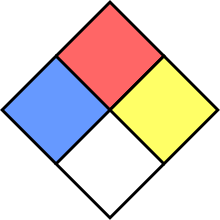Example of an NFPA 704 award
The risk of diamond (from English hazard diamond fire brigade and rescue services , for immediate assessment of the danger that when accidents with dangerous goods occur. The hazard symbol has the shape of a square. This NFPA 704 Hazard Identification System was developed by the American NFPA ( National Fire Protection Association English- speaking world, the hazard diamond is known as the NFPA Hazard Diamond .
In Europe, it is mainly to be found on general cargo from America , since the dangers of general cargo are declared differently in Europe (see dangerous goods labeling ). Conversely, the hazard symbols and classes of the UN Recommendations , which are also common in European ADR / RID and worldwide in shipping and air traffic, are already in use in the USA for marking tunnels .
Health hazard
Health hazard (blue field)
symbol
meaning
example
0
Without any particular danger.
peanut oil
1
Low dangers. Breathing equipment is recommended.
Turpentine oil
2
Dangerous! Stay with breathing apparatus and simple protective clothing only.
Ammonia gas
3
Very dangerous! Stay in the danger area only with full protective clothing and breathing apparatus.
Chlorine gas
4th
Extremely dangerous! Avoid any contact with vapors or liquids without special protection.
Prussic acid
Fire hazard
Fire hazard (red field)
symbol
meaning
example
0
No risk of ignition under normal conditions.
carbon dioxide
1
Risk of ignition only if overheated.
Rapeseed oil
2
Risk of ignition when heated.
Diesel fuel
3
Risk of ignition at normal temperatures.
petrol
4th
Extremely flammable at all temperatures.
propane
Danger of reaction
Danger of reaction (yellow field)
symbol
meaning
example
0
No danger under normal conditions.
liquid nitrogen
1
Becomes unstable when heated. Protective measures required.
phosphorus
2
Violent chemical reaction possible. Reinforced protective measures. Fire fighting attack only from a safe distance.
Calcium
3
Risk of explosion if exposed to heat or strong vibrations from impact. Form a safety zone. Extinguishing attacks only from safe cover.
fluorine
4th
Great risk of explosion! Form a safety zone. In the event of fire, evacuate the area immediately.
Trinitrotoluene (TNT)
special instructions As a result of the NFPA, only the symbols "W."," OX "and" SA "are provided, since the other hazards are already taken into account when classifying the corresponding fields. In practice, however, other symbols are also used:
literature Individual evidence
↑ FAQ: What other symbols can go in the special hazards quadrant of the "diamond"? ( Memento of the original from March 1, 2013 in the Internet Archive ) Info: The archive link was automatically inserted and not yet checked. Please check the original and archive link according to the instructions and then remove this notice. @1 @ 2 Template: Webachiv / IABot / www.nfpa.org
Web links
<img src="https://de.wikipedia.org//de.wikipedia.org/wiki/Special:CentralAutoLogin/start?type=1x1" alt="" title="" width="1" height="1" style="border: none; position: absolute;">

